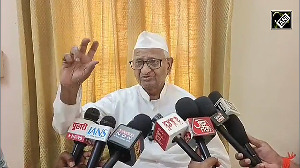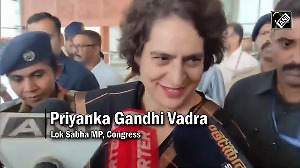
Prime Minister Narendra Modi has done the seemingly impossible by finalising the long-pending Land Boundary Agreement ahead of his Bangladesh visit, writes Prakash Bhandari.
The ratification of the Land Boundary Agreement between Bangladesh and India by Prime Minister Sheikh Hasina’s cabinet without any hassle would ensure that the Bangladesh parliament would also greenlight the proposal for its implementation.
The LBA, also referred to as the Indira-Mujib agreement, was signed in May 1974 for exchanging enclaves between the two countries.
The Bangladesh parliament had ratified the agreement, but it was not done by India. But now, since both houses of Parliament have passed the bill, it would go to the state assemblies -- Assam, Mizoram, Tripura, Meghalaya and West Bengal -- for formal approvals.
The assassination of former Bangladesh president Mujibur Rahman in August 1975 -- by which time India had already been brought under Emergency by Prime Minister Indira Gandhi -- caused the delay. India, under Emergency, had other priorities to be handled, and the ratification process was almost shelved.
There was another reason for shelving the LBA agreement after Mujib’s assassination -- the Indian government was also watching the political changes in in Bangladesh the post-Mujib era.
In the present scheme, the Bangladesh cabinet secretary M Musharraf Bhuiyan said, Dhaka would gain 10,041.63 acres from India -- Bangladesh would get a total of 111 enclaves covering 17,160.63 acres, while India would get 51 enclaves covering 7,119 acres.
Currently, the number of people in the Bangladeshi enclaves is 37,386, while the number in the 51 Indian enclaves is 14,090.
“It would serve as a catalyst for improving trust, connectivity, secure borders, and systematic and sustainable development,” says Farzan Rahman, an IT professional from Dhaka.
The LBA’s complexities and follies were the result of the indiscriminate division of villages before Partition in 1947.
Muhammed Zamir, a former career diplomat who served in the Pakistan foreign service, says the Radcliffe Boundary Commission which was set up by the British government prior to the division of India, should be blamed for all the mistakes done during Partition.
The Radcliffe commission was set up for Bengal and Punjab, but it did its job in a haphazard manner on issues relating to demarcation.
“Radcliffe was superficial in his approach to completing the task given to him. He was not sensitive to prevailing issues and his haste in submitting the commissions’ report left a number of omissions that resulted in suffering for a large number of people,” says Zamir.
“It was because of lack of clarity that for more than 67 years, a large number of people were denied social justice. The day after Independence was granted to the two countries, Indian and Pakistani representatives associated with the commission were given two hours to study the award which was written in a hurry,” he adds. “And it was to be notified the next day. Such was the haste under which the award was drafted.”
The Radcliffe award created enclaves in India and in erstwhile East Pakistan.
The blunders because of this award also resulted in confusion over territories. There was no suitable mechanism whereby control could be exercised by the two countries in the other's enclaves. Lack of clarity and the definition of possession of land in certain border areas also created a messy situation which persists till this day in localities in West Bengal, Tripura, Assam, Meghalaya and Assam.
The total area involved was about 982.40 acres, of which Assam's claim was 714 acres. In West Bengal, the disputed land was 4,355 acres, of which India’s claim was 2,398 acres. For Meghalaya, the area was small and was 256 acres out of 291 acres.
While detractors of former prime minister Jawaharlal Nehru blame him for not solving the issues relating to enclaves after the creation of East and West Pakistan, Nehru did make earnest attempts in 1958 through the Nehru-Noon Agreement This agreement was questioned by the Supreme Court in India, which ruled that any transfer of land could be affected only by amending the Constitution.
The Nehru government duly introduced an amendment in Parliament; however, it could not be passed because of the issues related to the transfer of Berubari enclave on the West Bengal–Bangladesh border.
After Nehru’s death, the bilateral relations between the two countries soured and the subsequent India-Pakistan wars of 1965 and 1971 left no room for any peaceful settlement.
However, after the formation of Bangladesh in 1971, the Indira Gandhi-Mujibur Rahman agreement was signed but India failed to live up to Dhaka's expectations in ratifying the agreement.
India and Bangladesh share a 4,095 km border which is the fifth-longest in the world, but the tension between the two countries also encouraged a lot of illegal immigration. Politicians of both the countries used the situation to their advantage.
Later, when the Trinamool Congress came to power in West Bengal and Prime Minister Manmohan Singh visited Dhaka, the situation worsened because Singh and Chief Minister Mamta Banerjee could not come to an agreement on the issue.
Prime Minister Narendra Modi is hailed as a hero in Bangladesh and his 'neighbourhood first’ policy has given a new dimension and hope to India-Bangladesh relations.
“Modi, though belonging to a pro-Hindu Bharatiya Janata Party government, has shown great political will and maturity by solving the border dispute for good. Both Modi and Prime Minister Sheikh Hasina would be remembered in history for the LBA, but one should not forget the earnest efforts of Indira and Mujib -- the two assassinated leaders,” said Mehfuz Massud, a Dhaka University student.
Now the residents of the enclaves in India and Bangladesh will have to choose their preferred homeland. There would many who would opt for India and vice versa.
However, in either case, they will have an identity which has eluded them for 67 since years since Partition.
Zamir says both the countries should facilitate the process of implementing the LBA and set up a joint committee with adequate representatives after framing the rules.
“The good thing is that India has already started the process. This will pave the way for better bilateral relations and Modi’s forthcoming visit would pave the way for resolving other outstanding issues like sharing of river waters -- particularly of Teesta."
Image: Border Security Force personnel patrol along the fenced border with Bangladesh in Fasidaya village on the outskirts of Siliguri in West Bengal. Photograph: Rupak De Chowdhuri/Reuters











 © 2025
© 2025